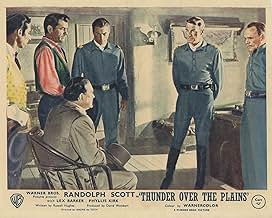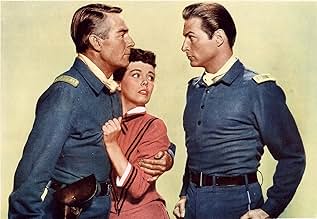अपनी भाषा में प्लॉट जोड़ेंIn Post-Bellum Texas, an army captain tries to keep the peace between overtaxed, impoverished farmers and greedy carpetbaggers.In Post-Bellum Texas, an army captain tries to keep the peace between overtaxed, impoverished farmers and greedy carpetbaggers.In Post-Bellum Texas, an army captain tries to keep the peace between overtaxed, impoverished farmers and greedy carpetbaggers.
- Hodges' Sergeant
- (बिना क्रेडिट के)
- Texan
- (बिना क्रेडिट के)
- Walter Morgan
- (बिना क्रेडिट के)
- Trooper
- (बिना क्रेडिट के)
- Texan
- (बिना क्रेडिट के)
- Kehoe
- (बिना क्रेडिट के)
फ़ीचर्ड समीक्षाएं
The rivalry between the two captains, Scott and Barker, is an interesting feature, especially when it extends to Scott's wife (Kirk). That scene where the home-sick wife is captivated by the handsome Barker is both well played and unusual for a western. Note too how Scott is compelled by the byplay to fade into the background, another unusual feature for a western hero.
Though filmed just west of LA, the rolling scenery makes a good Technicolor backdrop to the action. Much credit for making the elements work should go to director de Toth who was skilled at handling conflict as shown in his masterwork, Ramrod (1947). The redoubtable Sam Peckinpah also selected de Toth to direct many episodes of his groundbreaking TV series The Westerner (1960).
On the whole, it's a complicated story of personal and political conflict but still delivers the goods for fans of westerns.
Scott never looks unbelievable in his part.
Lex Barker, former Tarzan and later superman "Old Shatterhand", plays against his image as arrogant villain. And I think he does it very well.
The story is entertaining and there are a lot of other good actors like Henry Hull, Phyllis Kirk and Elisha Cook jr. in it.
This really is an enjoyable B-western directed by veteran Andre de Toth.
When the north defeated the south during the civil war, unfair practices were being exercised when southern farmers were unfairly overtaxed as opposed to regular farmers living in the north, forcing some to give up land easily belonging to them by auction. Fictionalize story line based on fact that if there is any reason to watch this film, it would only be for the history lesson. The action is not a plenty, but well- known Western actor Randolph Scott's tall, valiant screen presence keeps the film from becoming boring. This is the fourth of six movies Randolph Scott collaborated with director Andre De Toth.
Thunder Over The Plains sags just a bit in the middle, but has great production values and is fairly ambitious for a 1950's B-western, with some pretty complex characters. The cinematography and direction by Andre De Toth are excellent.
Elisha Cooke Jr. is pretty good as a sniveling tax collector. Lex Barker's character is especially vile, kind of a surprise considering the times in which this was made and the fact that Barker is so handsome and all-American looking!
It's 1869, and Texas is still not part of the Union. Carpetbaggers rule the state and criminal activity is high. Captain Porter (Scott), a proud Texan himself, finds he has to carry out orders against his own countrymen. When a man in town is murdered in cold blood, suspicion falls on rogue cowboy Ben Westman (McGraw), but Porter believes he's innocent and strikes a deal to bring him in for a fair trial. However, this sets off a chain of events that leads to Porter himself becoming a wanted man.
Knowing direction, fine acting and a darn good script, all make Thunder Over The Plains essential viewing for the 50s Western fan. The bonus, aside from the impressive support cast, is the story itself. This was a troubled time, a time when only two states were not yet accepted back into the Union post the Civil War. Toth and Hughes paint a murky town, one of corruption, tax oppression and shifty shenanigans. There's even room in the story for strains on the family home of Porter and an attempt at adultery. Throw in the nice colour and scenery, pace it briskly with enjoyable action set-pieces (the shoot out at the end is familiar but excellently done), and it's a fictionalised winner. 7/10
क्या आपको पता है
- गूफ़Growing cotton and transporting cotton bales thru the hilly countryside was a foolish director's scheme. In 1869 cotton wasn't grown within 1,000 miles of this area.
- भाव
Norah Porter: Whatever became of Frances Bilky?
Captain Bill Hodges: I don't know. She married a colonel, I think. Maybe it was a general. At any rate, she outranks all of us.
Norah Porter: But that's wonderful! Now she'll have her lifelong ambition to lead the cotillion. Well, I guess that's what I always wanted too.
Captain Bill Hodges: You don't have anything like that around here, do you, Captain?
Captain David Porter: Oh, I don't know. The Indians come down once a month and dance for us.
- कनेक्शनReferenced in Las Vegas, 500 millones (1968)
टॉप पसंद
- How long is Thunder Over the Plains?Alexa द्वारा संचालित
विवरण
- चलने की अवधि
- 1 घं 22 मि(82 min)
- पक्ष अनुपात
- 1.37 : 1































